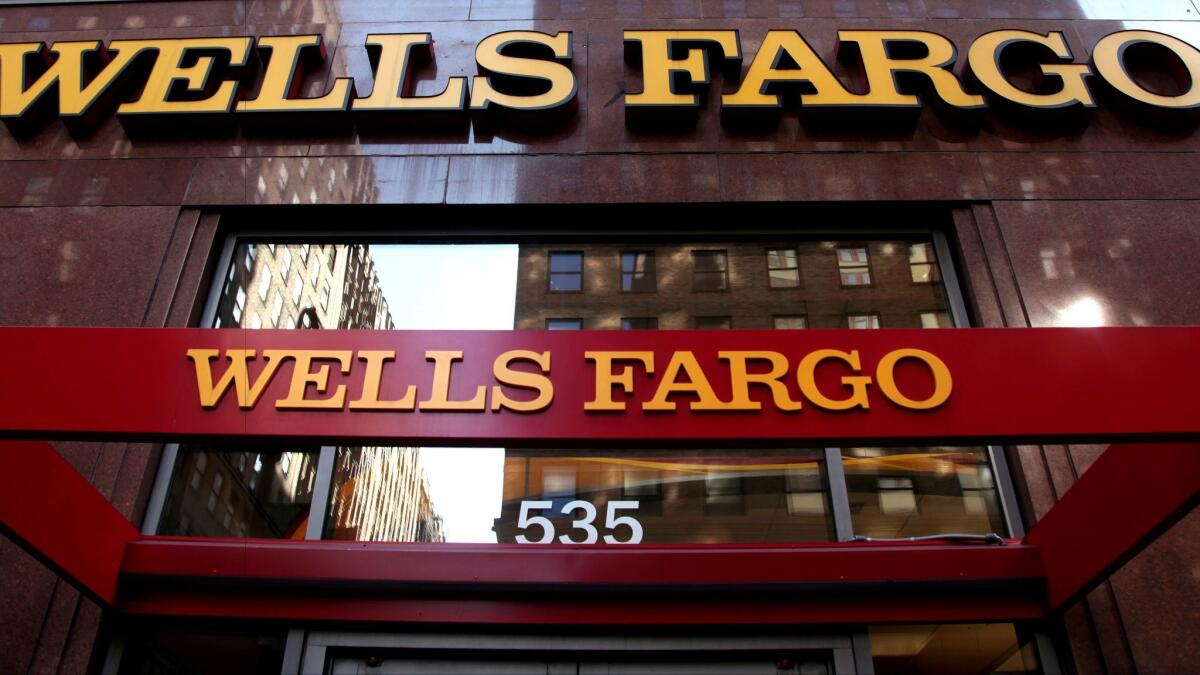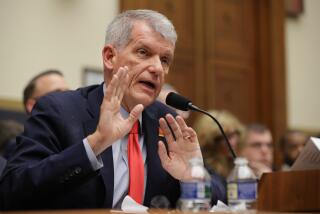Accounts scandal, wary customers take toll on Wells Fargo earnings

Wells Fargo & Co. reported first-quarter earnings Thursday that show the scandal over unauthorized customer accounts is eating into its bottom line.
The San Francisco bank said its net income totaled $5.5 billion, showing no growth from last year’s first quarter — though the results topped the modest expectations of Wall Street.
Wells Fargo Chief Executive Timothy Sloan acknowledged to analysts that the scandal involving sham checking, savings and credit card accounts has hurt the bank’s business. But he was optimistic that the hit wouldn’t last long.
“Of course it’s having an impact on performance at the moment,” Sloan said during a conference call Thursday. “What we’ve been able to demonstrate historically … is that we can work through those challenges.”
While profit was flat for the quarter ended March 31, revenue actually declined. It amounted to $22 billion, down $200 million from last year’s first quarter and lower than the $22.3 billion expected by analysts, according to data provider Factset.
The bank’s book of outstanding loans shrank, with loan balances at the end of the first quarter down $9.2 billion compared with the end of last year. That decline, executives said, was driven in part by a drop in consumer credit card balances, which fell by nearly $2 billion.
Some of that is seasonal, as consumers pay off bills after the holidays. But the bank also blamed some of the decline on the fact that new credit card account openings have fallen sharply since the accounts scandal, which first came to light in a 2013 Los Angeles Times investigation and drew national attention after a $185-million settlement with regulators in September.
Credit card applications have nosedived since the settlement sparked congressional investigations and forced out prior CEO John Stumpf. In March, customers applied for about 200,000 credit cards, a decline of 42% from 12 months earlier. That’s actually an improvement from February, when credit card applications fell 55% compared with the same month a year earlier.
Wells Fargo saw declines in other types of consumer lending too. It originated fewer auto loans and home mortgages, though different factors probably are at play. Rising interest rates have made mortgage refinancing less attractive and Wells Fargo has joined other lenders in tightening credit standards on auto loans, a move that would lead to fewer loans being made.
It’s not clear whether or how much the accounts scandal might be hurting those businesses, but Cathy Seifert, an analyst at CFRA Research, said she suspects that there’s been at least some effect — or that there will be in the months and years ahead.
“My sense is this will continue to have an impact on their ability to grow those various consumer businesses going forward,” she said. “I think that’s definitely something to be looking for in the next quarter.”
Along with cutting into loans, the scandal has also cost the bank in legal fees and other expenses. Wells Fargo reported that its spending on outside professional services due to the sham accounts and related issues was about $80 million in the quarter.
That went to pay for, among other things, an investigation released Monday on how the bank’s onerous sales goals led to the creation of as many as 2.1 million unauthorized accounts. The bank is paying for other internal inquiries too, including one looking into claims that Wells Fargo workers had applied for Prudential insurance policies on customers’ behalf without authorization, according to the report.
Wells Fargo Chief Financial Officer John Shrewsberry said during the conference call that he expects the bank to continue spending between $70 million and $80 million per quarter on issues related to the accounts scandal for some time.
“There are a couple outside firms doing major reviews,” he said. “Some of those [costs] will be around for several quarters.”
Shrewsberry and Sloan also discussed the bank’s effort to cut its operating costs by about $2 billion annually over the next few years.
That initiative includes cutting 400 branches nationwide by the end of next year, mirroring an industry trend as more customers get comfortable with mobile and online banking. Wells Fargo said it already has closed nearly 40 branches in the first quarter.
Despite higher costs, lower loan balances and lower-than-expected revenue, the bank’s net income reached $1 a share, beating analysts’ expectations of 96 cents.
JPMorgan Chase and Citigroup also reported earnings Thursday. Both beat expectations and reported first-quarter profits that were 17% higher than the same quarter last year. JPMorgan’s net income rose $6.4 billion, while Citi’s climbed to $4.1 billion.
Unlike Wells Fargo, JPMorgan and Citigroup saw modest loan growth in the quarter. They were also boosted by strong results from their investment banking divisions, a business in which Wells Fargo is a smaller player.
Wells Fargo shares closed Thursday at $51.35, down $1.77 or 3.3%. The other big banks also declined but less so, with JPMorgan shares falling 1.2% and Citigroup losing 0.8%.
Follow me: @jrkoren
UPDATES:
2:25 p.m.: This article was updated with a comment from analyst Cathy Seifert and closing stock prices of Wells Fargo, JP Morgan and Citigroup.
10:35 a.m.: This article was updated with an updated stock price, more details from the earnings reports and comments from the bank’s conference call.
This article was originally published at 5:50 a.m.
More to Read
Inside the business of entertainment
The Wide Shot brings you news, analysis and insights on everything from streaming wars to production — and what it all means for the future.
You may occasionally receive promotional content from the Los Angeles Times.










